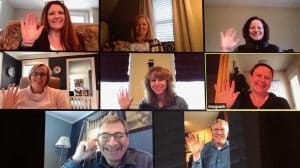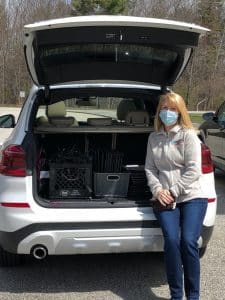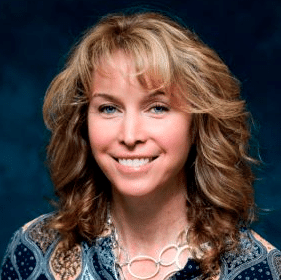Opportunities for Personalized Learning in the Pandemic
CompetencyWorks Blog

“A pessimist sees the difficulty in every opportunity; an optimist sees the opportunity in every difficulty.” — Winston Churchill.
In my job as a curriculum administrator, in Exeter, New Hampshire, I’ve spent the last several weeks working with other school administrators to quickly transition school as we know it into a remote learning experience. Although I tend to be an optimist, our current situation has me feeling a sense of impending doom. I worry for those infected with COVID-19 and those who are caring for them. While it’s hard to believe that anything good could come out of a pandemic, the challenges we are facing have provided educators with some valuable opportunities as professionals, parents, and community members to deepen our work in personalized, competency-based education.
The opportunity to empower students: Our school district has been shifting to competency-based education over a period of years. However, transitioning to a remote learning environment has created a sense of urgency to embrace the elements of competency-based education that empower students. For example, teachers are no longer delivering a single daily lesson or following a time-bound curriculum map. Instead, students are “empowered daily to make important decisions about their learning experiences,” which is part of the definition of competency-based education. Students are scheduling and organizing their learning time, moving though online lessons at their own pace, and utilizing the resources that best meet their learning needs. Remote learning has swiftly put students in the driver’s seat.

Assessment practices in a remote learning environment can also be an opportunity to empower students. Traditional, content-heavy tests are difficult to deliver online. Instead, many teachers are providing students with choice in how they demonstrate their learning. For example, Jake Goodwin and Seth Macomber, seventh-grade social studies teachers at the Cooperative Middle School in Stratham, NH have assigned their students a self-paced inquiry project called “What is change?” Students are tasked with designing a research proposal, based on evidence they collect, related to the concept of change. The final demonstration of learning calls for students to organize and present their findings to a target audience. For now, presentations, in the form of websites, slide decks, speeches, and reports to peers, will take place in a virtual environment. Assessments such as this, which are personalized and engaging, can be empowering learning experiences for students.
The opportunity for deeper learning: The truncated school year and the elimination of dedicated class time will require teachers to make critical curricular decisions about content and skills. It isn’t possible to cover everything or to expect students to complete every project, essay, experiment, report, or other course requirement. Choices must be made: what to keep and what to cut?
Mike Durant, a math teacher at the Cooperative Middle School is concerned about the social and emotional impact this crisis is having on his students. Mike said that he often wonders, “What does it look like at home for these students?” When thinking about the math content left to cover, Mike was concerned about trying to teach the next unit — functions and slope — without being able to provide students with the space to ask questions and collaborate with one another. Although it’s an important part of the curriculum, Mike recognized that more harm than good could come from trying to cover the complex material remotely. Instead, he is introducing students to a geometry unit, one that he was rarely able to get to in most years. He created a Google site for students which includes a number of required lessons as well as resources (videos, activities, and tools) students can access as they work to complete the final performance of designing their own town using geometric principles.

Like many other teachers, Mike has embraced this opportunity to emphasize competency over content. Instead of lamenting what can’t be covered, he’s focusing on meaningful learning experiences that require students to apply academic content to the skills of communication, problem solving, and critical thinking. These are some of the skills his students will need in their future academic lives and in the world of work.
The opportunity to be empathetic: The everyday lives of teachers and students have never been more in sync: confined to our homes, forced into solitude, unable to connect with our tribe, relying on technology as our lifeline, and worrying about what’s going to happen next. When I asked my ninth-grade son what he missed most due to our confinement, without hesitation he said “school.” Many of us miss school. We miss seeing colleagues, students, teachers, and friends. Students are looking to their teachers to provide that missing link — opportunities for connection with peers and teachers. It’s a gift to be able to empathize with students and to provide a remote community to help them cope with their isolation. It’s also an opportunity to support their social-emotional learning. So, If you’ve ever wondered if computers will someday take the place of classroom teachers, I would say the answer is “no…never.”
The opportunity to be grateful: On a typical day we don’t often think about the number of people it takes to run a school. The rapid transition to remote learning has underscored the important role that each person plays in our schools and districts. Teachers, administrators, facilities crews, food service employees, technology workers, and support staff have had to perform unconventional tasks in order to support our school community such as:
- Delivering meals and technology to families,
- Writing remote-learning guides and providing online PD,
- Creating home studios to record lessons,
- Hosting remote IEP meetings and supporting students in virtual spaces,
- Deep cleaning and disinfecting classrooms and offices, and
- Conducting wellness checks and providing resources to families.
In a time of such uncertainty, we are grateful that the members of our school community will do whatever it takes to support students and families.
An opportunity to connect: COVID-19 has given some of us precious time with our families. Although working at home while taking care of our own children can be stressful, it can also be an opportunity to connect. My family has prioritized making time to disconnect from technology and be present with each other.
My teenage sons and I have been taking mid-day breaks from school work to walk our dog. On our walks, sometimes conversations are light, like when we discussed the importance of bacon to our overall well being. And, sometimes conversations are profound, which is something I rarely experienced in our pre-pandemic lives. With the absence of sports and activities, we now have the time to eat dinner as a family — every night.
The coming weeks and months will test our resilience as a society, and much of what happens will be out of our control. Rather than dwell on the negative, let’s focus on what we can control: choosing to empower our students, to be empathetic, to be grateful to everyone supporting our students, to focus on deeper learning, and to embrace unexpected opportunities.
Learn More
- Virtual Youth Summit Supports Student Agency and Community-Building During COVID-19 School Closures
- Silver Linings: Observations of Self-Directed Behavior in an Online Environment
- Personalized Learning from a Distance: An Early Report from Schools Closed by Coronavirus

Ann Hadwen is the 6-12 Curriculum Administrator for the Exeter Region Cooperative School District in Exeter NH. She was previously an Assistant Principal at Sanborn Regional High School in Kingston, NH where she was part of a team that developed a nationally-recognized K-12 competency based learning system. Before becoming an administrator she taught social studies at the middle and high school levels in both Massachusetts and New Hampshire. She has a B.A. in Political Science from the University of Portland an M.A.T. from Simmons College, a M.Ed. from Rivier College, and is currently enrolled in an Ed.S. program at the University of New Hampshire. She is also a partner in Education Design Studios, an organization that holds an annual summer conference focused on CBE and personalized learning.